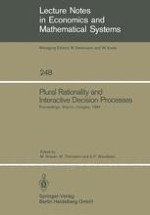1985 | OriginalPaper | Buchkapitel
Uses of Experimental Games
verfasst von : Anatol Rapoport
Erschienen in: Plural Rationality and Interactive Decision Processes
Verlag: Springer Berlin Heidelberg
Enthalten in: Professional Book Archive
Aktivieren Sie unsere intelligente Suche, um passende Fachinhalte oder Patente zu finden.
Wählen Sie Textabschnitte aus um mit Künstlicher Intelligenz passenden Patente zu finden. powered by
Markieren Sie Textabschnitte, um KI-gestützt weitere passende Inhalte zu finden. powered by
The distinction between a descriptive or predictive theory on the one hand and a prescriptive or normative one on the other is sufficiently clear. Still there is a region of overlap between them. Generally speaking, a descriptive theory deals with what is and a prescriptive one with what ought to be. But “ought” can be understood in two senses: in terms of a value system and in terms of an idealized situation. Questions of value do not enter the realm of physical science. Nevertheless we can speak of normative theories of physical phenomena in the sense of our expectations of what we should observe under idealized conditions, such as in perfect vacuum, thermodynamic equilibrium, etc. In fact, since physical theories consist for the most part of mathematical models of physical phenomena, they are, strictly speaking, normative theories, dealing with how things “ought” to behave under idealized conditions, rather than with how they actually behave. What makes physical theory also descriptive (and predictive) is the circumstance that the mathematical models are often very good approximations to reality, so that “what is” turns out to be quite close to “what ought to be.”
